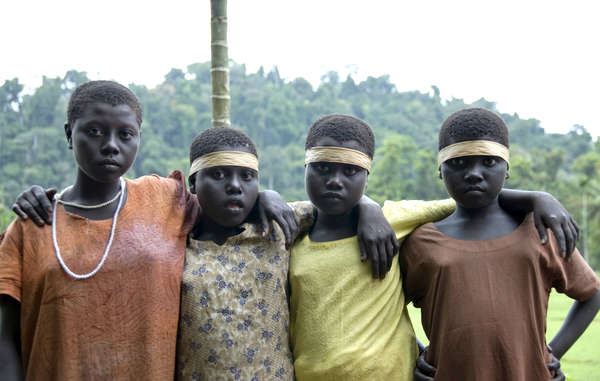First Amazon Indian to run London Marathon - News from Survival
- Details
- Published on Monday, 20 April 2015 04:17
- Written by editor

First Amazon Indian to run London Marathon
 Nixiwaka Yawanawá training for the London Marathon in April 2015. © Survival International
Nixiwaka Yawanawá training for the London Marathon in April 2015. © Survival International
Nixiwaka Yawanawá will be the first Amazon Indian to run the London Marathon on Sunday, April 26, 2015.
Nixiwaka is raising vital funds for Survival International – the global movement for tribal peoples’ rights – together with Survival’s co-founder and President Robin Hanbury-Tenison, who is running the marathon as one of eight challenges to mark his 80th year.
Nixiwaka – from the Yawanawá tribe (“The People of the Wild Boar”) in Brazil’s Acre state – has been working with Survival in the U.K. to speak out for tribal peoples’ rights.
During his time with Survival, Nixiwaka led protests against Brazil’s assault on indigenous rights, as well as the "false and damaging" portrayal of tribal peoples by photographer Jimmy Nelson. Nixiwaka visited numerous schools across the UK to raise awareness of the Amazon and its peoples.
 Wearing his traditional headdress and facial decoration, Nixiwaka led a protest against Brazil's assault on indigenous rights in London in October 2013. © Survival International
Wearing his traditional headdress and facial decoration, Nixiwaka led a protest against Brazil's assault on indigenous rights in London in October 2013. © Survival International
Nixiwaka spent much of his childhood in Kaxinawa, the most sacred part of the Yawanawá’s lands. He studied in the small town of Tarauaca until the age of 10, before returning to the village of his tribe.
Nixiwaka said, "We, the Yawanawá, have lived on our land for centuries and our way of life developed from our ancestors. We live close to nature. We get our food, housing, medicine, and virtually everything we need from our rainforest. Our spiritual leaders are known as ‘doctors of the rainforest.’ They know the powers of our medicinal herbs and plants – from tree bark to frog saliva, we hold the answers for cures and poisons alike.
“The forest is a magical place. But when we see harm come to the rainforest, it is as if a part of our own body has been hurt. It feels like an illness that rises up in us and needs to be cured.”
Acre state is home to about a dozen tribes. At least four are uncontacted – the most vulnerable societies on the planet. Their lands are threatened by roads, oil and gas extraction projects.
Notes to editors:
- Read more about Nixiwaka
- Visit Nixiwaka and Robin Hanbury-Tenison’s Virgin Giving Fundraising pages
Read this online: http://www.survivalinternational.org/news/10740
India misses deadline to end Andaman 'human safaris'
 Vehicles queue to enter the Jarawa's forest. Tourists are still flocking to the Jarawa reserve, treating the tribe like animals in a safari park. © www.andamanchronicle.net /Survival
Vehicles queue to enter the Jarawa's forest. Tourists are still flocking to the Jarawa reserve, treating the tribe like animals in a safari park. © www.andamanchronicle.net /Survival
Authorities on India’s Andaman Islands have failed to end “human safaris” to the vulnerable Jarawa tribe by their self-imposed deadline of March 2015.
While the islands’ administration has made some positive steps towards taking tourists off an illegal road that runs through the Jarawa’s reserve, progress on the alternative sea route has been woefully slow.
In 2013, the Andaman authorities promised the Indian Supreme Court that they would introduce an alternative sea route by March 2015, but building work has not yet started. Plans have also been announced to widen the Andaman Trunk Road (outside the reserve) and build two new bridges.
It has been five years since the “human safaris” were first exposed by Survival International, the global movement for tribal peoples’ rights, and over 12,000 people have since pledged not to holiday in the Andaman Islands until the human safaris are stopped.
 The Jarawa are vulnerable to exploitation by outsiders, and poachers are known to lure young Jarawa women with alcohol or drugs to sexually exploit them.© Survival
The Jarawa are vulnerable to exploitation by outsiders, and poachers are known to lure young Jarawa women with alcohol or drugs to sexually exploit them.© Survival
But hundreds of tourists continue to pass through the reserve on a daily basis, disturbing the game the Jarawa hunt for their survival, and effectively treating the Jarawa like animals in a zoo.
The Jarawa are extremely vulnerable to exploitation by outsiders and could face a similar fate to that of the neighboring Great Andamanese tribe, who were decimated by forced settlement and diseases introduced by British colonizers.
Last year, it was revealed that poachers regularly enter the Jarawa reserve and some lure young Jarawa women with alcohol or drugs to sexually exploit them.
Survival’s Director Stephen Corry said today, “The longer the construction of the alternative route takes to complete, the greater the risk to the Jarawa who, like all recently contacted peoples, face catastrophe unless their land is protected. It’s a hugely positive step that the process has begun, it is now vital that the alternative route is built as quickly as possible.”
Read this online: http://www.survivalinternational.org/news/10735
You’re receiving...
 Monthly highlights
Monthly highlights
 Urgent campaigns
Urgent campaigns
 News as it happens
acclaimed roundup of the month's top stories
important alerts so you can take action
frequent updates
News as it happens
acclaimed roundup of the month's top stories
important alerts so you can take action
frequent updates
 Annual reports
Annual reports
 Shopping
our yearly review and special appeals
special offers from our range of cards and gifts
Shopping
our yearly review and special appeals
special offers from our range of cards and gifts
r7.
Survival International USA, 2325 3rd Street, Suite 401, San Francisco, CA 94107, USA
T +1 415 503 1254
Survival International, 6 Charterhouse Buildings, London EC1M 7ET, UK
T +44(0)20 7687 8700
www.survivalinternational.org


